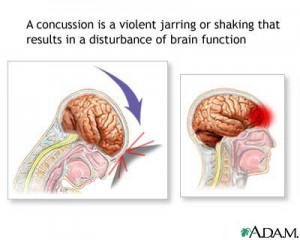Concussion Recovery After Whiplash
In our St George UT chiropractic office, we see lots of whiplash, and sports injuries. One nasty co-morbidity is concussion. Treating the whiplash is somewhat straight forward and patients are generally willing to do their share. They can feel the pain, and see the loss of neck movement. Essentially, they are on-board with treatment plan because they know they have an injury. But with concussions, it is a different story. Patients tend to not fully appreciate the damage to the brain and they are less likely to follow the treatment protocols to manage the concussion.

Concussions need to be treated with mental rest as well as physical rest. St George Chiropractor, Dr. Andrew White has special training in dealing with concussion injuries related to whiplash and car accidents.
When our chiropractic office is treating whiplash, we look for specific markers like, pain, range of motion, numbness in the arms, headache frequency and severity. We follow those markers and tailor a treatment plan to maximize the recovery. Those treatment plans often include chiropractic adjustments, range of motion exercises, physiotherapy like ultrasound and EMS, muscle rehab, massage, and balance exercises like yoga. However, when it comes to concussions, it is a different approach. The concussion is treated with rest. The clincher is the types of rest. Concussion is treated with physical and mental rest.
The Journal of Pediatrics just published a research article on concussion. In it, they looked at how cognitive rest was important in returning the person to a pre-injury status. Without proper treatment of the concussion, patients can have post-concussion syndrome and symptoms even months later. Post-concussion syndrome involves fatigue, headaches, mental fogginess (also known as Brain Fog), and difficulty concentrating or sleeping.
Study design
Forty-nine high school and collegiate athletes were prescribed at least 1 week of cognitive and physical rest after their concussion injury. Participants were assigned to three groups based on how much time had passed since the concussion injury, some were a week, others 2-3 weeks, and some were greater than 4 weeks. The study participants had to undergo significant cognitive rest. They could not watch TV, talk on the phone, do puzzles, or anything which would require the brain to be exercised. Seems like a challenge for high school and college students.
Results
Participants showed significantly improved performance on standard concussion and brain injury assessment tools and decreased symptom reporting following prescribed cognitive and physical rest, regardless of the time between concussion and onset of rest. This is important, because in the study some participants had a concussion for an entire month before starting the program and they still showed improvement. So even if a patient suffered a concussion and did nothing about it for a month, there is still hope of meaningful recovery.
Conclusion
According to the study authors, “A period of cognitive and physical rest may be a useful means of treating concussion-related symptoms, whether applied soon after a concussion or weeks to months later.” So when you have been injured in a car crash, it is important to follow the recommendations of your expert chiropractor. If your current chiropractor does not specialize in treating injuries resulting from a car crash, it might be a good idea to switch for the injury, then return back to your regular chiropractor when you have been released. Whiplash and concussions are serious injuries and you do not want an inexperienced chiropractor dabbling around.
Dr. Andrew White
St George Whiplash Chiropractor


